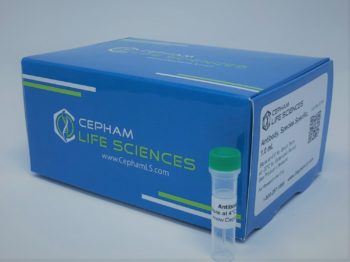Description
Aliases
ANDR; DHTR; AR
Antibody Type
Polyclonal Antibody
Uniprot ID
Swiss-Prot: P10275
NCBI Protein: NP_000035.2
Immunogen
Peptide sequence around phosphorylation site of serine 213 (E-A-S(p)-G-A) derived from Human Androgen Receptor.
Raised In
Rabbit
Species Reactivity
Human
Tested Applications
WB IF Recommended dilution: Predicted MW: 110kd, Western blotting: 1:500~1:1000, Immunofluorescence: 1:100~1:200
Background / Function
The androgen receptor gene is more than 90 kb long and codes for a protein that has 3 major functional domains: the N-terminal domain, DNA-binding domain, and androgen-binding domain. The protein functions as a steroid-hormone activated transcription factor. Upon binding the hormone ligand, the receptor dissociates from accessory proteins, translocates into the nucleus, dimerizes, and then stimulates transcription of androgen responsive genes. This gene contains 2 polymorphic trinucleotide repeat segments that encode polyglutamine and polyglycine tracts in the N-terminal transactivation domain of its protein. Expansion of the polyglutamine tract causes spinal bulbar muscular atrophy (Kennedy disease). Mutations in this gene are also associated with complete androgen insensitivity (CAIS). Two alternatively spliced variants encoding distinct isoforms have been described.Brinkman, A.O. et al. (1999) J. Steroid. Biochem. Mol. Biol. 69, 307-313. Avila, D.M. et al. (2001) J. Steroid. Biochem. Mol. Biol. 76, 135-142. Montgomery, J.S. et al. (2001) J. Pathol. 195, 138-146.
Conjugate
Unconjugated
Storage Buffer
Supplied at 1.0mg/mL in phosphate buffered saline (without Mg2+ and Ca2+), pH 7.4, 150mM NaCl, 0.02% sodium azide and 50% glycerol.
Form
liquid
Storage
Shipped at 4°C. Upon delivery aliquot and store at -20°C or -80°C. Avoid repeated freeze.
Purity
Antibodies were produced by immunizing rabbits with synthetic phosphopeptide and KLH conjugates. Antibodies were purified by affinity-chromatography using epitope-specific phosphopeptide. Non-phospho specific antibodies were removed by chromatogramphy using non-phosphopeptide.
Modification
Phospho-Ser213
Additional information
| Size | 100?l |
|---|


